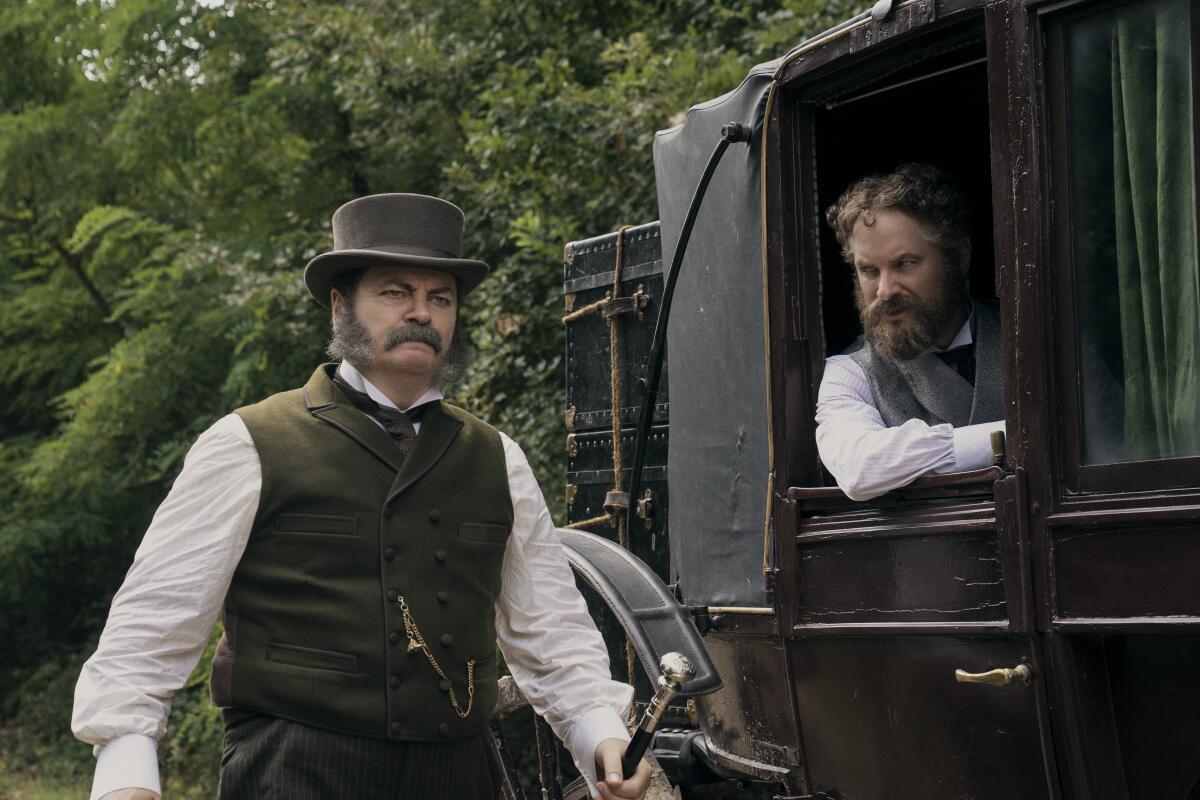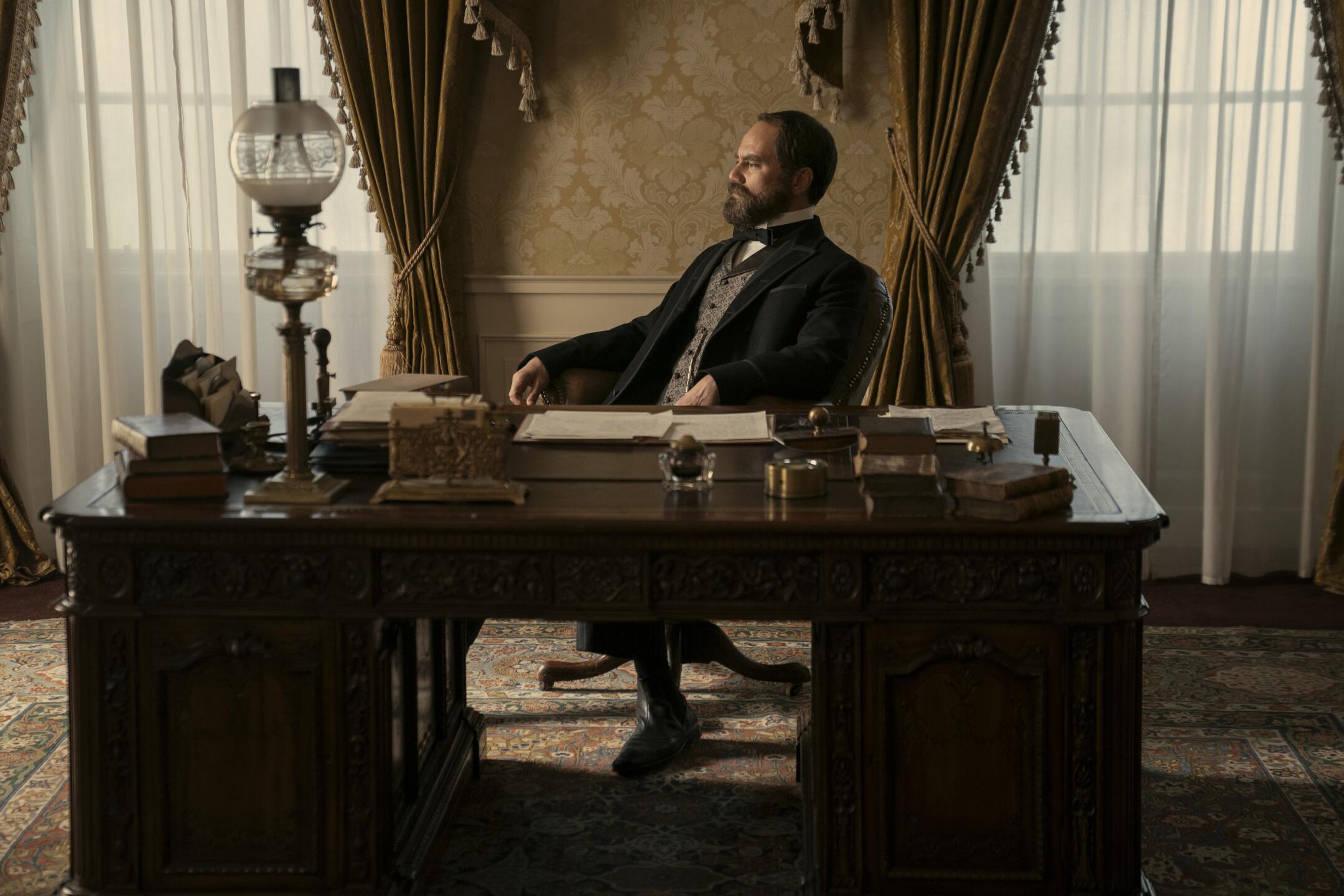
This article contains some spoilers for the Netflix miniseries “Death by Lightning.”
Feeling overwhelmed by current events? Then you might be surprised by Netflix’s new four-part series, “Death by Lightning,” which premieres Thursday. It tells the unbelievable story of a chaotic period after the Civil War, filled with widespread corruption. The series focuses on a presidential candidate unexpectedly chosen, only to be tragically assassinated by a supporter early in his presidency – a leader who many believe could have been one of our greatest.
The show immediately tackles the central question it introduces: just who was Charles Guiteau?
Mike Makowsky, the creator of the show, has been deeply immersed in researching James Garfield for seven years. He based the series on Candice Millard’s 2011 book, “Destiny of the Republic,” which details Garfield’s life. Most people vaguely recall that Garfield was the 20th president, serving briefly in 1881 before his assassination, but few know much beyond that.
Makowsky says his own representative often calls the actor Andrew Garfield. He admits he, like many Americans, wasn’t very familiar with Garfield before reading Candice Millard’s excellent book.

‘Death by Lightning’ offers a surprising story about an assassinated president gone too soon
The Netflix miniseries, adapted from Candice Millard’s book, reveals the surprising story of President James A. Garfield and the man who killed him.
Makowsky realized he didn’t know much about one of the four U.S. presidents who had been assassinated. Hoping to improve his knowledge for a future appearance on ‘Jeopardy!’, he decided to learn more and ended up reading a whole book about it in a single sitting.
Matt Ross, the director of “Captain Fantastic,” brings together a talented cast in his new film, “Death by Lightning.” Betty Gilpin plays Lucretia Garfield, the First Lady, while Nick Offerman portrays Chester A. Arthur, the president who followed Garfield and was known for his heavy drinking and partying. Michael Shannon stars as James Garfield, a brilliant and virtuous president dedicated to fighting corruption, and Matthew Macfadyen plays Charles Guiteau, the disgruntled man who assassinated him.
Ross explains he deliberately chose actors against type. People might expect Michael Shannon to play the villainous Guiteau, given his history of playing complex, often tough or bad characters. Conversely, Matthew Macfadyen is usually known for portraying more heroic roles.
Guiteau isn’t a charming or sophisticated character like Mr. Darcy from “Pride and Prejudice,” or even the ambitious Tom Wambsgans from “Succession.” He’s much more similar to the unstable characters often portrayed in Martin Scorsese’s films – definitely not someone like Jim Garfield.
The proto-incel with a gun
In “Death by Lightning,” Guiteau comes across as a manipulative, delusional man with grand ambitions and a disturbing lack of morals – perhaps even a sociopath. He’s a precursor to the modern “incel,” standing in stark contrast to President Garfield, who the author describes as genuinely good and honorable, using terms from the Dungeons & Dragons role-playing game.
Many people see Guiteau as simply chaotic and evil, but that’s a pretty simplistic way to look at him. The show aims to explore the reasons why someone like him became so disconnected from society and what drove his actions, really digging into his mind to understand him.
Guiteau belonged to the Oneida community, a unique religious group in New York known for its shared living, open relationships, and honest feedback – the same group that later started the silverware company. However, he struggled to fit in and enjoy the community’s lifestyle. His inflated sense of self-importance made it hard for others to connect with him, and the women in the community reportedly nicknamed him “Charles Gitout.”
According to Ross, people consistently found him unpleasant – they described him as disagreeable, strange, rude, and self-centered. This is why they needed an actor with completely different qualities. He represents an extreme case of someone who craved attention and affection, despite having no successful work to show for it.

Ross portrays Macfadyen’s character as kind, warm, and humorous. He explains this was intentional, as the historical Guiteau was a troubled man who suffered severe psychological abuse from his father, leaving him essentially unable to function.
While reading about Guiteau, Makowsky was reminded of Rupert Pupkin, the obsessed fan played by Robert De Niro in Martin Scorsese’s “The King of Comedy.” He describes Guiteau as relentlessly pursuing an audience with President Garfield, facing constant rejection until it seemed to drive him to a breaking point. Makowsky sees a direct connection between Guiteau and fictional characters like Pupkin and Travis Bickle, suggesting he was a neglected individual whose actions tragically cost the nation a potentially great president.
Makowsky remembers filming the one scene where Garfield and Guiteau finally meet, with Guiteau, the self-proclaimed ‘greatest fan,’ coming face-to-face with his idol. Macfadyen, who played Guiteau, unexpectedly began to cry during the scene. It wasn’t planned, and Makowsky believes it was a genuinely moving moment for the actor. He feels that scene, more than any other in the series, allows the audience to empathize with Guiteau.
Party (hearty) over country
Chester A. Arthur took office after Garfield, and according to Makowsky, he was a surprisingly unlikely president. Makowsky points out that Arthur had never been elected to any position, and before becoming vice president, his only political job was essentially being a key figure in the corrupt political organization run by New York Senator Roscoe Conkling. The level of corruption within that organization was shockingly blatant.
Nick Offerman delivers a lively and often boisterous performance as the character, and the writer, Makowsky, says he envisioned Offerman in the role from the very beginning. Makowsky took some creative freedoms with the story, including a scene where the character and his associate go on a drunken spree. He admits this probably didn’t happen in real life, but felt it was a compelling idea he couldn’t ignore.

Nick Offerman portrays Chester A. Arthur, who later becomes President, and was a strong ally of New York Senator Roscoe Conkling, played by Shea Whigham.

Betty Gilpin plays First Lady Lucretia Garfield, showing her as just as smart and capable as her husband. (Larry Horricks / Netflix)
According to Makowsky, Lucretia Garfield was just as intelligent as her husband, but as a woman of her time, her opportunities were limited. He wonders what she could have accomplished if she’d had the chance. He believes actress Betty Gilpin perfectly embodies that same strength and intelligence.
Gilpin brought her family with her to Budapest while filming, fully immersing herself in the character of Lucretia by studying everything she wrote to her husband. Her role becomes more complex throughout the series, culminating in a powerful and memorable confrontation with Guiteau that brings the story to a close.
Ross remembers Betty playfully threatening him, saying, ‘If you cut that scene, I’ll kill you!’ He immediately knew it wasn’t going anywhere, explaining, ‘There was no way that scene was being cut—it was one of my favorites in the whole show.’ According to Ross, everyone who read the scene loved it, and Betty delivered an amazing performance, consistently nailing it take after take.
The forgotten president
Ross was immediately struck by Makowsky’s scripts, finding them surprisingly relevant and offering a new perspective on American history. He explains, “As an American, I’m constantly thinking about what it truly means to be American.” He believes the story of James Garfield is incredibly compelling – a champion for working-class people and the ideals of American democracy, where power isn’t concentrated in the hands of the wealthy. He feels this message is especially important today.
I always thought it was amazing how Garfield really embodied the American dream. He came from very little, and through hard work and determination, he climbed all the way to the highest office in the country. It’s a truly inspiring story to me.
He was an extraordinary figure – a war hero with a brilliant mind. While serving in Congress, he proved his intellectual prowess by developing mathematical theories and could flawlessly recite Homer. A powerful and gifted speaker, he was remarkably forward-thinking for his time, especially when it came to important issues like civil rights, access to education for everyone, and improvements to the civil service system.
As shown in the series and in historical records, Garfield collaborated with prominent African American leaders such as Frederick Douglass and Blanche Bruce, whom he made the first Black Register of the Treasury.
According to Makowsky, the loss of Garfield was a significant tragedy, as he could have become one of the most impactful leaders of his time.

James A. Garfield wasn’t trying to be the Republican nominee in 1880. He was actually speaking in support of someone else at the convention. However, his speech impressed the delegates so much that they convinced him to run, after over 30 ballots failed to produce a clear winner. This reminded Makowsky of Barack Obama’s 2004 Democratic National Convention speech, which offered a hopeful and confident vision for America’s future.
These days, it’s much harder for someone without significant financial support to become a successful political candidate. As Ross explains, the amount of money in politics now means it’s nearly impossible to run a campaign without substantial backing.
Ross is quick to point out that the show isn’t meant to be a historical account, but rather a drama. At times, “Death by Lightning” feels like a dark comedy. While the dialogue generally captures the formal language of the 1880s, it occasionally bursts into surprisingly funny and passionate outbursts, reminding us that these were real people with strong emotions.
Ross believes this story is so rich and detailed it could fill a ten-hour documentary. He explains that Makowsky cleverly presented the historical events by focusing on the contrasting lives of James Garfield and his assassin, Charles Guiteau.
I find both of these figures fascinating. One is a truly inspiring American leader who deserves wider recognition – I believe he could have been a great president. The other is a troubled individual, seemingly driven by a desire for fame and attention. Seeing this period of history from their contrasting perspectives is what I found so compelling.
Read More
- Clash Royale Best Boss Bandit Champion decks
- Vampire’s Fall 2 redeem codes and how to use them (June 2025)
- Mobile Legends January 2026 Leaks: Upcoming new skins, heroes, events and more
- World Eternal Online promo codes and how to use them (September 2025)
- Clash Royale Season 79 “Fire and Ice” January 2026 Update and Balance Changes
- Best Arena 9 Decks in Clast Royale
- Best Hero Card Decks in Clash Royale
- Clash Royale Furnace Evolution best decks guide
- FC Mobile 26: EA opens voting for its official Team of the Year (TOTY)
- Clash Royale Witch Evolution best decks guide
2025-11-06 14:02